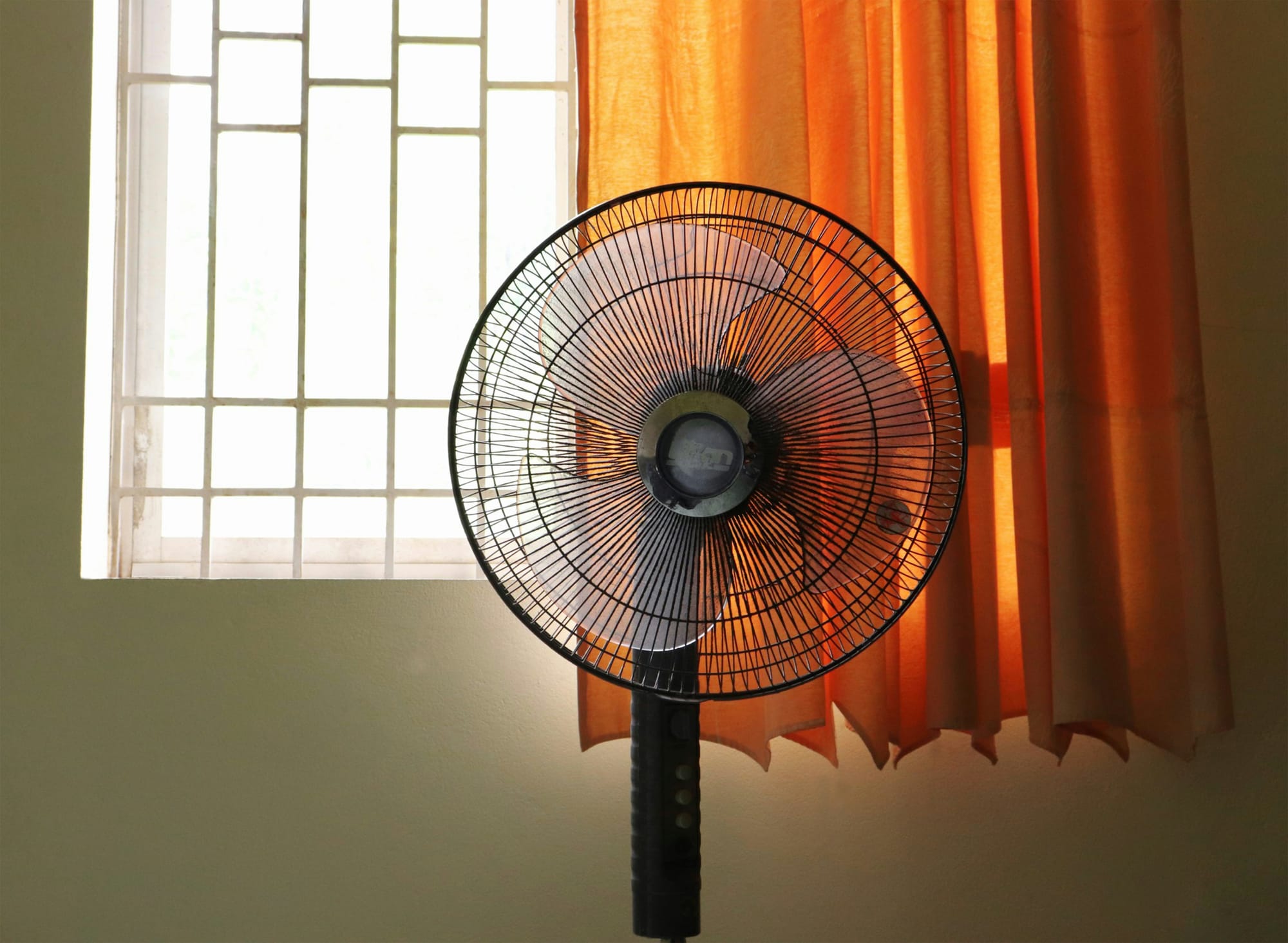Poopy Potomac no more? D.C. lifts advisory for river after sewage spill
But environmentalists say more has to be done to convince people the waters are safe
What to do if your home doesn't have AC.

Stepping outside feels like walking into a wall of clear cement, storms are ripping through the city without (somehow) breaking the humidity, and everyone is sweaty, all the time. Welcome to D.C. summer.
Air conditioning is a refuge in these months, but it’s a luxury not every renter has. Here’s what to know about your legal rights, and what you can do if your home doesn’t have AC.
The 51st is a team of journalists, not lawyers. If you have questions or concerns about your lease, rent payments, or landlord disputes, it’s best to seek legal counsel. We have several resources linked below.
The short answer: no.
Unlike heating standards in D.C.’s housing code – which require landlords to maintain a certain temperature between October and May – there is no similar requirement for air conditioning. While heat is considered a “necessity,” air conditioning is treated as an amenity. It is not among the things your landlord must provide to create, legally speaking, “habitable living conditions.” (This is fairly common in Northeast cities; New York, Philadelphia, and Baltimore have similar rules. However, neighboring Montgomery County passed a bill in 2020 requiring landlords to provide AC.)
What you can do is consult your lease agreement, according to Adam Marshall, a managing attorney with the Neighborhood Legal Services Program.
“If air conditioning is provided by the landlord or is in the lease, then it needs to work,” he says. “But if it's not provided and not in the lease, then it is not a requirement under the housing code.”
So if you move into an apartment and there’s a window unit there when you arrive – or if it’s spelled out in the terms of your lease that the landlord provides some form of air conditioning – it is your landlord’s responsibility to ensure it works properly.
According to D.C.’s housing code standards, if a building provides any kind of AC, it must be maintained between May 15 and shut off no earlier than September 15. Temperatures in the “rooms the A/C system is intended to serve” must be 78 degrees or at least 15 degrees cooler than the temperature outside, whichever is higher.
But otherwise, your landlord is not legally required to cool your home. There are other steps you can take to stay cool, however.
Consult the lease agreement to see if there is anything prohibiting you from installing your own window unit. (It may be under a “no alterations” clause.) If you don’t see this, or you’re confused, it’s best practice to consult with the landlord to make sure you are not violating the lease, but the decision is ultimately up to you.
“I don't know that I would tell someone who's in severe distress in the summer, not to get an air conditioning unit,” Marshall says. He does note, though, that the general rule is that it would become a fixture in the apartment, meaning that your landlord gets to keep it when you leave.
If you choose to purchase an air conditioner on your own, the DC Sustainable Energy Utility (DCSEU) expanded its rebate program to renters this year. The rebates – which can offer up to 50% off two units per household – are open to anyone, regardless of income, and don’t require a Department of Building inspection.
“We obviously encourage [renters] to work with their landlords, just to verify what's allowed within their lease,” said DCSEU’s residential rebate program manager, Emmett Deitcher. “But there's no requirement on our end to determine anything around installation or procedures within their building. As far as we are concerned, if they submit a receipt for an eligible product, we're happy to give them a rebate, assuming it meets the requirements.”
You can read about the application process for rebates here. They cover Energy Star-certified products, and Deitcher said many stores like Lowe's or Home Depot will tell you whether the product is eligible for a rebate when you enter your zip code online.

Reach out to your landlord, property manager, or super and let them know about the issue. As with any communications with management or property owners, it’s a good idea to get some form of documentation. Screenshot your call history, record calls, and/or save emails.
It’s also a good idea to get some documentation of the temperature. If you have a thermostat, take photos of the readings. You can also get creative; take photos of anything melting or video of a sputtering AC unit.
This is when some personal decision-making will come in. If you don’t want to – or can’t – wait for your landlord to resolve the issue, Marshall says you can file a complaint in D.C. Superior Court’s housing conditions court and get an emergency hearing. And you don’t have to wait to do so after first reaching out to your landlord.
“Especially someone in [a]vulnerable situation, there's not a specific requirement to wait for a set amount of time,” Marshall says.
Filing a complaint can be done without a lawyer (and can be done entirely online) – but the proceedings can be complicated, and it’s recommended that tenants get some legal assistance to navigate the process.
There are several resources to help: the Landlord Tenant Legal Assistance Network (LTLAN), which assists low-income tenants, is staffed with lawyers trained in tenant law from several local organizations (fill out an intake form online or call 202-780-2575 to get help). Renters who make more than the income threshold for LTLAN can receive free legal advice from the Landlord Tenant Resource Center, which is located in the D.C. Superior Courthouse (510 4th St NW, Building B, Room 223 on the second floor.)
Emergency hearings are typically scheduled within days, or sometimes even a few hours, of a complaint being filed.
You can also report negligent landlords to the Department of Buildings. This will not immediately resolve the issue, but it may help build a rap sheet against a landlord if they are frequently violating tenants’ rights. You can request a DOB inspection online or request an immediate inspection by calling 311.
DOB filings are important documents – even if you have a court order pending – because the D.C. attorney general’s office may use them to open an investigation in situations of chronic neglect. While housing conditions court may, in cases of large corporations, issue monetary sanctions and the DOB may hand down fines, an AG case is one of the strongest enforcement mechanisms against recurrently negligent landlords. You can call OAG's consumer mediation hotline at 202-442-9829 or file a complaint online.

Landlords are explicitly prohibited from such retaliation. Filing a complaint about housing violations is among the “protected activities” that tenants are legally entitled to engage in (others include calling DOB and joining a tenant association).
That doesn’t mean it never happens. But if a landlord opens a case against a tenant within six months of them engaging in a “protected activity,” that can be used as a direct defense in court. If you suspect your landlord has done this, Marshall says you can also file a tenant petition with the rental accommodations division of the Department of Housing and Community Development.
Meanwhile, even if you are currently in a non-payment of rent case with your landlord, you should still file a housing court complaint if any mandated air conditioning is not working. (It’ll be added into your non-payment case.) Submitting the complaint may even help.
As we outlined in our no-heat guide, foregoing payments until an issue is resolved is a personal choice with varying levels of risk.
If you decide to stop paying, make sure you have documents of everything going wrong in your apartment, especially anything that may be related to the landlord’s failure to maintain air conditioning (like warping floors and windows or cracking drywall). In the case that your landlord does file a non-payment case against you, this evidence can lower the amount you owe.
D.C. law prevents providers from shutting off power on the day of or the day before extreme temperatures (that’s anything 95 degrees and above or 32 degrees and below).
If you need help paying your electric bill, you’re not alone! The utility monopoly Pepco reported that in May, more than 92,000 residential customers owed on their electric bills. (This comes as the company issued a rate hike of nearly 18% at the start of June.)
There are several avenues for help. The city’s Department of Energy and Environment offers a utility discount program, the Greater Washington Urban League has a utility assistance program, and Pepco says it’s reopening its financial assistance program in July.
If you are living in public or subsidized housing and your AC isn’t working, you can contact the ADA office within the D.C. Housing Authority to lodge a complaint. You may also reach out to HUD’s Office of Fair Housing and Equal Opportunity.
But even tenants not living in subsidized housing are entitled to “reasonable accommodations” or “reasonable modifications” under the Americans with Disabilities Act and D.C.’s Human Rights Act.
Reasonable accommodations are things your landlord may do (or a policy they may change) to adapt to your disability. For example, if a landlord has window units in an apartment but only turns them on starting on May 15, a tenant with a disability who needs it earlier could submit a reasonable accommodation request to change the landlord’s policy.
However, reasonable accommodations do not require a landlord to spend money on unit upgrades. So, if a tenant requires AC for their disability, they could request something called a reasonable modification, which allows the tenant to make changes to the unit at their own expense. This may look like asking your landlord if you can install a necessary AC unit.
“Of course, there are some cost barriers to this,” Marshall says. “Many low-income tenants cannot afford to make their own reasonable modifications.”
He refers tenants in reasonable modification situations to the city’s Department of Aging and Community Living’s "Safe at Home" program, which funds home upgrades for low-income elderly and disabled tenants. While this program typically focuses on mobility upgrades, Marshall says it’s a good place to start. (You can also check out the DCSEU’s rebate program mentioned above.)
In 2020, the D.C. Council briefly took up a bill from At-large councilmember Anita Bonds that would’ve required landlords to provide air conditioning to elderly or disabled tenants. Unfortunately, it never went anywhere.
The 51st reached out to Bonds as well as the current chair of the council’s housing committee, At-large councilmember Robert White, to see whether they’d consider taking this bill or a similar measure up again, but they haven’t responded.
While Marshall, who has been working as a housing attorney for about a decade, says that it’s typical to meet tenants every summer who are struggling with non-functioning air conditioning units, the intensity of our heat – and the long stretches of hot days without relief – are creating more threatening consequences.
“The difference we're seeing now is that I think the stakes are a little higher, because of the hotter summer and the longer stretches of extreme, unbroken heat,” he said. “The fact that it's not necessarily a requirement that a landlord provide air conditioning doesn't mean that it can't be an emergency for someone.”
With your help, we pursue stories that hold leaders to account, demystify opaque city and civic processes, and celebrate the idiosyncrasies that make us proud to call D.C. home. Put simply, our mission is to make it easier — and more fun — to live in the District. Our members help keep local news free and independent for all: